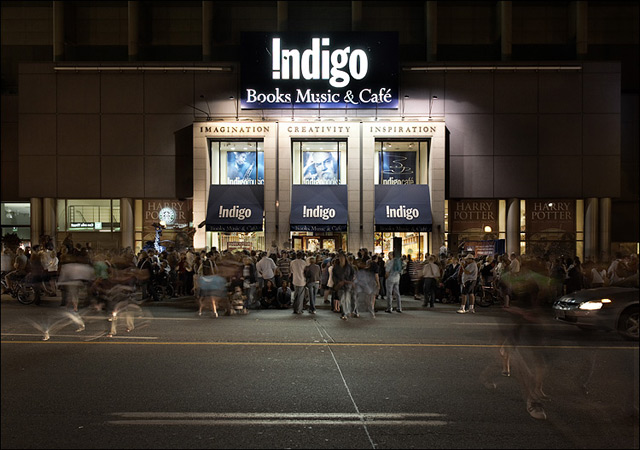Indigo Shows The Way Forward For Bookshops

Even in a thousand years, when we all have quantum computers and live on one of Jupiter’s moons, there will still be bookshops. They might be niche, even more niche than they currently are; they might be subscriber-only or in some kind of 31st-century museum complex showing how we used to live back when Earth was still habitable.
The reason for this is that bookshops are great. They’re the only place where shopping is a luxury, rather than a chore. And even the smallest bookshop is virtually infinite in volume: Think of the smallest bookshop you’ve ever been in; you’d do well to read every book in there in a lifetime.
And that’s why, despite the omnipresent rumblings in the publishing industry about the death of books/hardbacks/novels/publishing, there’s still at least one bookshop in ever mall and town center. People want them. The market provides.
Those convinced that the cheaply-available books from Amazon or in the form of e-books will finally kill the industry would do well to remember that people said the same about Penguin and its incredibly cheap paperback editions of classics, and that was in the 1930s. The Frankfurt Book Fair has existed for almost as long as books have, and has been discussing the death of the publishing industry for exactly the same amount of time. We’re still waiting.
Indigo-Chapters, as it’s currently known, is a product of the latest trend in the ongoing but possibly imaginary death of publishing. The two bookshops merged in 2001, keeping open as many stores as possible while moving some of their stock online (inevitably) to keep pace with the fast-changing global book market, driven by Amazon’s revolution in the world of bookselling. To this end, they’ve kept prices low by offering Indigo-Chapters coupons and also embraced technology with repeated expansions into Amazon’s territory. For example, they now sell books online as well as in their stores, so you can get Indigo-Chapters coupons online, too.
Indigo-Chapters also launched and eventually span-off the popular line of Canadian e-readers, Kobo. This engagement with online selling and e-readers clearly demonstrates the way forward for booksellers of all types and sizes: Embrace the technology, don’t reject it. People want a bookshop they can sit and relax in or explore all afternoon and they want quick, cheap access to books when they need it. Indigo provide all the above, which is why they’ve been able to weather the tropical storm that is Amazon.
Having once been the target of accusations of monopolistic practices, Indigo-Chapters now has to head off a still more-effective monopoly from Amazon. This may be progress, of a sort, in that for all each company has been accused of monopolising its market, both are still fighting to stay ahead of the game by providing more to consumers for less, with Indigo-Chapters promo codes and all manner of deals, bargains offers and other incentives. This, after all, is the point of a modern market: To deliver meet demand with supply for as low a price as possible.
